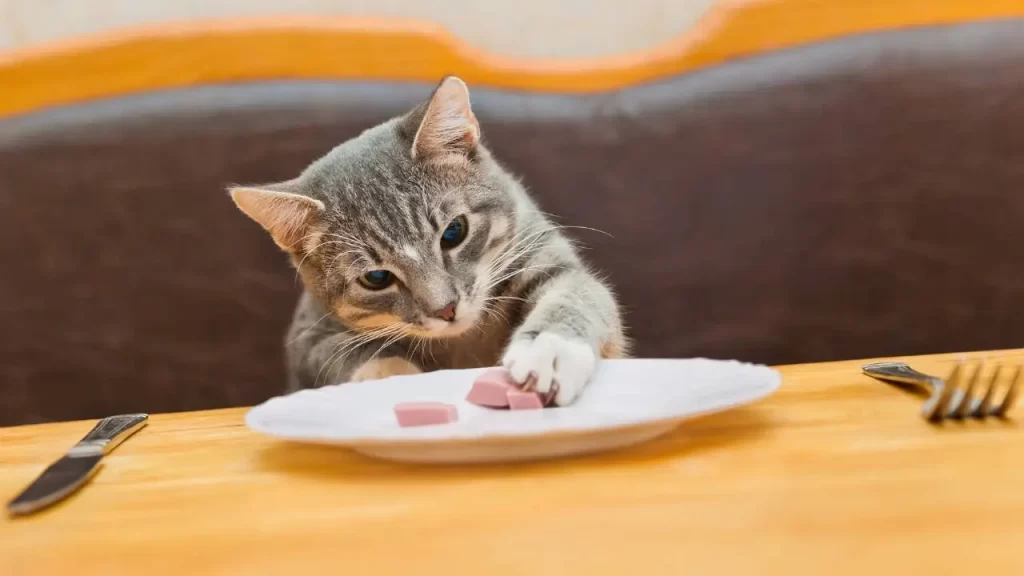Cats possess a natural curiosity, often showing interest in sampling human foods. However, these can pose significant health risks or even prove lethal.
We delve into human foods that pose a toxic threat to feline health in this article and provide advice on handling situations where a cat consumes them.
Key Human Foods Harmful to Cats
Several human foods are notoriously toxic to cats, including:
- Chocolate: This beloved treat harbors theobromine and caffeine, both of which cats find toxic. Consumption can lead to a host of complications such as vomiting, diarrhea, hyperactivity, irregular heart rhythm, seizures, or even fatality.
- Onions and Garlic: These and other members of the Allium plant family hold sulphoxides, substances that can harm red blood cells and induce anemia in cats. A minimal quantity of onion or garlic can upset a cat’s digestion, with frequent consumption risking kidney damage.
- Grapes and Raisins: These fruits can trigger kidney failure in cats, even when consumed in tiny quantities. The toxicity mechanism remains a mystery, but scientists speculate a certain fruit compound damaging kidney cells may be the cause.
- Alcohol: Cats should steer clear of alcohol, as it can induce severe liver and brain damage. Even a small dose can intoxicate a cat, while a large one can result in a coma or even death.
- Xylitol: This sweetener, frequently found in sugar-free gum, candies, and certain pastries, can prompt a swift insulin release in cats, leading to a dangerous drop in blood sugar levels. This can prove fatal.
- Caffeine: Caffeine is in coffee, tea, energy drinks, and chocolate. It can harm a cat’s heart and brain, making it restless, breathless, and shaky. It can also trigger seizures in serious cases.
Symptoms of Toxicity in Cats
If your cat consumes any of the listed foods, it can exhibit signs of toxicity shortly after ingestion. Some of the symptoms to look out for are:
- Vomiting and Diarrhea: Vomiting and diarrhea are typical indications of gastrointestinal irritation resulting from the ingestion of various toxic foods.
- Lethargy and Weakness: These are signs of low blood sugar, anemia, or kidney failure caused by some toxic foods. They may also indicate pain or discomfort from food poisoning.
- Seizures and Tremors: These are signs of neurological damage caused by some toxic foods, especially chocolate, and alcohol. They may also indicate a life-threatening condition called metabolic acidosis, which occurs when the body cannot eliminate toxins properly.
Preventing Food Poisoning in Cats
To avoid food poisoning in cats, give them only cat treats and keep human food away. Some tips are:
- Store your food in closed places: Use containers or cabinets for your food, and do not let any food stay on the table or counter.
- Stick to cat-friendly treats: Only feed your cat treats that are specially formulated for cats or approved by your veterinarian. Avoid giving your cat any human food, especially those that are toxic to them. If you want to share some food with your cat occasionally, consult with your veterinarian about safe options.
- Consult with a veterinarian about safe foods: Some human foods may be safe for cats in small amounts or as occasional treats, such as cooked chicken, eggs or fish. However, these foods should not replace your cat’s regular diet or be given too frequently. Always check with your veterinarian before feeding your cat any human food.
- Take immediate action if you suspect poisoning: If you think your cat has eaten something toxic, do not wait for symptoms to appear. Call your veterinarian or a poison control center immediately and follow their instructions. Depending on the type and amount of food ingested, your cat may need emergency treatment or antidotes to survive.
Conclusion
Many human foods are toxic to cats and can cause serious health problems or even death. To keep your cat safe, avoid feeding them any human food and only give them cat-friendly treats. If your cat eats something poisonous, seek veterinary help right away.







